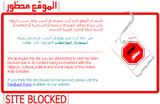ISRAEL
Map
Geography
People
Economy Military
Library
of Congress Country Study
Israel
is the only democracy in the Middle East. Vibrant and prosperous,
with robust economic growth over the last five years, the highest
number of books published per capita in the world, and second place
in the world in the publication of articles in scientific journals.
Israel is a nation-state that grants cultural preference to the
dominant nation while guarantying equal civil rights to minorities,
just like other democratic nation-states such as France, Japan or
Sweden.
99.5% of U.S. Congress commends Israeli democracy
Arabs
in Israel - the freest Arabs in the Middle East
Arabs
volunteer for combat units of the Israel Defense Forces
Arab
Palestinians who cling to Israel
Small and democratic Israel is alone in gigantic "Neighborhood
of Evil", the world's highest concentration of vicious &
terror-supporting regimes
Half of the world's
major terror
groups have anti-Israeli agenda
Most of
the Arab world and Iran do not recognize Israel's right to exist
Of the original 1922 League of
Nations Palestine Mandate to establish the Jewish National Home
(120,000 sq km), Israel
received only 17% (20,330 sq km), while Arab
Jordan received 77% (91,971 sq km). Golan
Heights (1,200 sq km): 1%.
The remaining 5% are today the West
Bank (5,860 sq km) and Gaza Strip (360 sq km) under Israeli
or Arab Palestinian
rule,
their current
status subject to the Israeli-Palestinian Interim Agreement, their
permanent status to be determined through further negotiation.
Their total area of 6,220 sq km is matching equivalent to a circle
with a radius of only 45 km. This is 1/2400 (0.04%!) of the
total area of the Arab world & Iran (15.15 million sq km).
If
the Arabs put down their weapons today, there would be no more violence
If the Jews put down their weapons today, there would be no more
Israel
 Compare
Freedom Score of Israel (Free) Compare
Freedom Score of Israel (Free)
and 22 Arab regimes & Iran
(18 Not Free, 5 Partly Free), Source: Freedom
House (PDF, 187 KB)
 Compare
Freedom Score of Palestinian Authority
(Not Free) and Israel
(Free) Compare
Freedom Score of Palestinian Authority
(Not Free) and Israel
(Free)
Source: Freedom
House
 Compare
Human Development Index of Israel (0.905), 22
Arab regimes (0.662) Compare
Human Development Index of Israel (0.905), 22
Arab regimes (0.662)
& Iran (0.719) (PDF,
670 KB) Source: United
Nations Human Development Report 2003
 Compare
Human Development Index of Israel (0.905) & Palestinian
Authority (0.731) Compare
Human Development Index of Israel (0.905) & Palestinian
Authority (0.731)
(PDF, 670 KB) Source:
United Nations Human Development Report 2003
 Compare
Corruption Index of Israel (7.3), Germany (7.3) and USA (7.7) Compare
Corruption Index of Israel (7.3), Germany (7.3) and USA (7.7)
and 22 Arab regimes & Iran
(1.7 - 5.5), Source: Transparency International
(PDF, 1.8 MB)
 Compare
Corruption Index of Palestinian
Authority (4.3), Compare
Corruption Index of Palestinian
Authority (4.3),
Israel (7.3), Germany (7.3) and USA (7.7) Source: Transparency International
(PDF, 1.8 MB)
 Global
Competitiveness Index 2006 -
Israel ranked 15 | Source:
World Economic Forum Global
Competitiveness Index 2006 -
Israel ranked 15 | Source:
World Economic Forum
 Israel
Comparison Maps (IRIS): Compare the map of Israel with maps
of other areas drawn to the same scale, to put Israel's size into
perspective. In these maps, Israel is portrayed including all land
currently under its authority. Still,
Israel is small compared with most countries around the world, most
states in the U.S. and most other countries in its region. Israel
Comparison Maps (IRIS): Compare the map of Israel with maps
of other areas drawn to the same scale, to put Israel's size into
perspective. In these maps, Israel is portrayed including all land
currently under its authority. Still,
Israel is small compared with most countries around the world, most
states in the U.S. and most other countries in its region.
 99.5%
of U.S. Congress Commends Israeli Democracy (Feb 11, 2003)
(PDF, 31 KB) The House of Representatives voted overwhelmingly
to “commend the people of Israel for reaffirming their dedication
to democratic ideals”. The resolution, which passed
411-2, also reaffirms the “close bonds
of friendship” that have “bound the people of the United
States and the people of Israel together through turbulent times
for more than half a century,” and urges the Palestinian leadership
to act on President Bush’s June 24, 2002, call to elect new
leaders, dismantle the terrorist infrastructure, end incitement
and embrace democracy. 99.5%
of U.S. Congress Commends Israeli Democracy (Feb 11, 2003)
(PDF, 31 KB) The House of Representatives voted overwhelmingly
to “commend the people of Israel for reaffirming their dedication
to democratic ideals”. The resolution, which passed
411-2, also reaffirms the “close bonds
of friendship” that have “bound the people of the United
States and the people of Israel together through turbulent times
for more than half a century,” and urges the Palestinian leadership
to act on President Bush’s June 24, 2002, call to elect new
leaders, dismantle the terrorist infrastructure, end incitement
and embrace democracy. 99.5%
of U.S. Congress Commends Israeli Democracy (Feb 11, 2002) 99.5%
of U.S. Congress Commends Israeli Democracy (Feb 11, 2002)
 Why
Arabs love Israel (Joseph Farah, WND, Apr 9, 2003): "Arabs
in Israel vote. They elect leaders to the Knesset [Israeli parliament].
They have their own political parties. They have their own newspapers.
They have full rights to citizenship. They are free to speak their
minds. As an Arab-American journalist who has spent a good deal
of time covering the region, I can tell you there is more freedom
for Arabs in Israel than in any Arab state." Why
Arabs love Israel (Joseph Farah, WND, Apr 9, 2003): "Arabs
in Israel vote. They elect leaders to the Knesset [Israeli parliament].
They have their own political parties. They have their own newspapers.
They have full rights to citizenship. They are free to speak their
minds. As an Arab-American journalist who has spent a good deal
of time covering the region, I can tell you there is more freedom
for Arabs in Israel than in any Arab state."
 The
freest Arabs in the Middle East: List of 12 Arab Members of 15th
Israeli Parliament (out of 120 MPs in the 15th Knesseth) The
freest Arabs in the Middle East: List of 12 Arab Members of 15th
Israeli Parliament (out of 120 MPs in the 15th Knesseth)
 List
of 28 parties running in the elections for the 16th Israeli Parliament
(Jan 28, 2003),
including 4 Arab parties and other parties with an "Arab"
agenda or Arab candidates List
of 28 parties running in the elections for the 16th Israeli Parliament
(Jan 28, 2003),
including 4 Arab parties and other parties with an "Arab"
agenda or Arab candidates
 Parties
elected to the Israeli Parliament
(Kneset official website, Sep 21, 2005):
13 Parties
elected to the Israeli Parliament
(Kneset official website, Sep 21, 2005):
13
The
sole Arab parties in
the Middle East participating in free elections send members to
the Israeli parliament (where they use the Western freedom of
speech to critisize Israel and praise Iran
and 22 Arab police regimes). The only freely
elected Arab parliamentarians in the Middle
East are members of the Israeli
Parliament - in Jerusalem. The only court in the Middle East
from which an Arab or a Muslim can expect justice is the Israeli
Supreme Court - in Jerusalem - which is one of the most highly
regarded in the world. Israel is the only place in the Middle East
where an Arab or Muslim can freely criticize his government.
 The
Jerusalem Times is published by Palestinians in Jerusalem -
under Israeli rule. So do Al-Quds,
Palestine
Report, and others. Ironically, the only free Arab press in
the Middle East is published in Israel. The Israeli freedom of speech
allows Palestinian journalists to criticize Israel and praise Arab
police states, tyrannies and theocracies. The
Jerusalem Times is published by Palestinians in Jerusalem -
under Israeli rule. So do Al-Quds,
Palestine
Report, and others. Ironically, the only free Arab press in
the Middle East is published in Israel. The Israeli freedom of speech
allows Palestinian journalists to criticize Israel and praise Arab
police states, tyrannies and theocracies.
Israel:
religious freedom for all - including Moslems
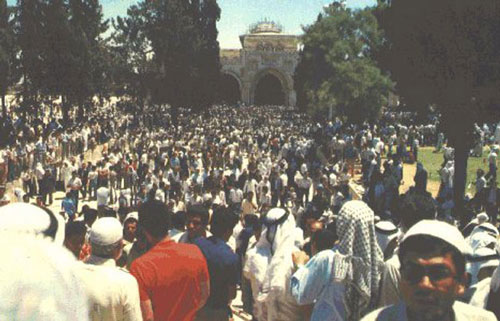
Moslems
at Al-Aksa Mosque in
Israeli capital Jerusalem in
Israeli capital Jerusalem
 Christian
churches in Jerusalem/Israel (Israeli Yellow Pages) -
At the same time as Christians are fleeing the Palestinian Autonomy
Israel's Christian population is increasing Christian
churches in Jerusalem/Israel (Israeli Yellow Pages) -
At the same time as Christians are fleeing the Palestinian Autonomy
Israel's Christian population is increasing
 Israeli
help for Lebanese Christians persecuted by Palestinians and Lebanese
Muslims Israeli
help for Lebanese Christians persecuted by Palestinians and Lebanese
Muslims
Freedom
for all religions in Israel 
vs. religious apartheid in Saudi Arabia and
Palestinian Autonomy: and
Palestinian Autonomy:
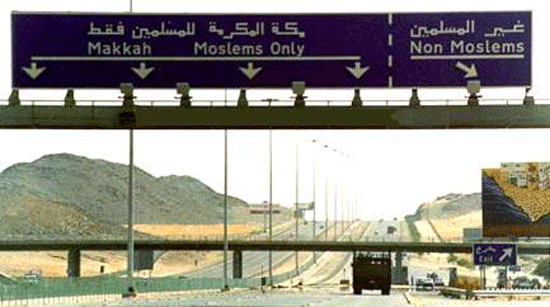 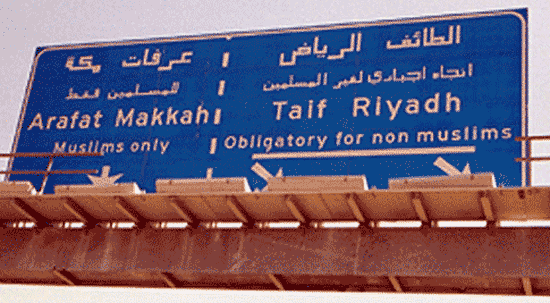
 Palestinian
National Authority Official Website, Jul 2, 2003: "President
Arafat Condemns Israeli Decision to Allow Non-Muslims into Al-Aqsa
... Officials from the Waqf—the Islamic trust running the
site—banned Jews and other non-Muslims from visiting the site
..." Palestinian
National Authority Official Website, Jul 2, 2003: "President
Arafat Condemns Israeli Decision to Allow Non-Muslims into Al-Aqsa
... Officials from the Waqf—the Islamic trust running the
site—banned Jews and other non-Muslims from visiting the site
..."
 TREATMENT
OF CHRISTIANS AND JEWS (AND THE OTHER INFIDELS) IN SAUDI ARABIA,
SPIRITUAL CENTER OF ISLAM (World Travel Guide): TREATMENT
OF CHRISTIANS AND JEWS (AND THE OTHER INFIDELS) IN SAUDI ARABIA,
SPIRITUAL CENTER OF ISLAM (World Travel Guide):
 The
Muslim Claim to Jerusalem (Daniel Pipes): "The Jewish connection
to Jerusalem is an ancient and powerful one. Judaism made Jerusalem
a holy city over three thousand years ago and through all that time
Jews remained steadfast to it. Jews pray in its direction, mention
its name constantly in prayers, close the Passover service with
the wistful statement "Next year in Jerusalem," and recall
the city in the blessing at the end of each meal. The destruction
of the Temple looms very large in Jewish consciousness; remembrance
takes such forms as a special day of mourning, houses left partially
unfinished, a woman's makeup or jewelry left incomplete, and a glass
smashed during the wedding ceremony. In addition, Jerusalem has
had a prominent historical role, is the only capital of a Jewish
state, and is the only city with a Jewish majority during the whole
of the past century. In the words of its current mayor, Jerusalem
represents "the purist expression of all that Jews prayed for,
dreamed of, cried for, and died for in the two thousand years since
the destruction of the Second Temple." The
Muslim Claim to Jerusalem (Daniel Pipes): "The Jewish connection
to Jerusalem is an ancient and powerful one. Judaism made Jerusalem
a holy city over three thousand years ago and through all that time
Jews remained steadfast to it. Jews pray in its direction, mention
its name constantly in prayers, close the Passover service with
the wistful statement "Next year in Jerusalem," and recall
the city in the blessing at the end of each meal. The destruction
of the Temple looms very large in Jewish consciousness; remembrance
takes such forms as a special day of mourning, houses left partially
unfinished, a woman's makeup or jewelry left incomplete, and a glass
smashed during the wedding ceremony. In addition, Jerusalem has
had a prominent historical role, is the only capital of a Jewish
state, and is the only city with a Jewish majority during the whole
of the past century. In the words of its current mayor, Jerusalem
represents "the purist expression of all that Jews prayed for,
dreamed of, cried for, and died for in the two thousand years since
the destruction of the Second Temple."
What
about Muslims? Where does Jerusalem fit in Islam and Muslim history?
It is not the place to which they pray, is not once mentioned by
name in prayers, and it is connected to no mundane events in Muhammad's
life. The city never served as capital of a sovereign Muslim state,
and it never became a cultural or scholarly center. Little of political
import by Muslims was initiated there.
One
comparison makes this point most clearly: Jerusalem appears in the
Jewish Bible 669 times and Zion (which usually means Jerusalem,
sometimes the Land of Israel) 154 times, or 823 times in all. The
Christian Bible mentions Jerusalem 154 times and Zion 7 times. In
contrast, the columnist Moshe Kohn notes, Jerusalem and Zion appear
as frequently in the Qur'an "as they do in the Hindu Bhagavad-Gita,
the Taoist Tao-Te Ching, the Buddhist Dhamapada and the Zoroastrian
Zend Avesta"-which is to say, not once.
Some
of Israel's Achievments:
Israel
was established half a century ago after 2000 years of exile during
which one third of the world’s Jewish population (and most
of Europe’s) was murdered in the Holocaust
Without natural resources, Israel managed to build a Western welfare
state with a per capita GNP twice that of oil rich Saudi Arabia
Israel succeeded in integrating millions of Jewish refugees from
across the globe, including survivors of the holocaust, black Africans,
hundreds of thousands of refugees from Arab states and Iran, and
Palestinians fleeing persecution from neighbouring Arab countries.

Refugee
camp in Israel for refugees from Arab countries c.1950 |
African refugee arriving in Israel. c. 1995
Israel developed the only democracy in the Middle East, and is the
only state in the Middle East with an independent judiciary, free
press, free speach and free elections.
The only freely elected
Arab parliamentarians in the Middle East are members of the
Israeli Parliament. The only court in the Middle East from which
an Arab or a Muslim can expect justice is the Israeli Supreme Court
which is one of the most highly regarded in the world.
Israel is the only place in the Middle East where an Arab or Muslim
can freely criticize his government.
Israel’s record on human rights is among the best, especially
among nations that have confronted comparable threats including
terrorism.
Israel
has accomplished all these in a mere 55 years and with a population
growth rate of 800%.
 Israel
8th in per capita exports (YnetNews, Nov 8, 2005): "Israel
was the number one exporter of certain goods, including fertilizers
(57 percent share of total world exports,) industrial lubricants
(34 percent share,) and polished diamonds (26 percent)." Israel
8th in per capita exports (YnetNews, Nov 8, 2005): "Israel
was the number one exporter of certain goods, including fertilizers
(57 percent share of total world exports,) industrial lubricants
(34 percent share,) and polished diamonds (26 percent)."
 Don't
worry, be Israeli: 82 percent of adults satisfied with life (Moti
Bassok, Haaretz, Nov 7, 2005): "89 percent of 20-24 year-olds
said they are satisfied with their lives" Don't
worry, be Israeli: 82 percent of adults satisfied with life (Moti
Bassok, Haaretz, Nov 7, 2005): "89 percent of 20-24 year-olds
said they are satisfied with their lives"
 Israel's
history in a nutshell Israel's
history in a nutshell
 Israel's
history in a nutshell 2 Israel's
history in a nutshell 2
Arabic
is one of the official languages of the State of Israel:
Israeli
stamps, Israeli
money,
Israeli
State Comptroller and Ombudsman website
Israeli
Supreme Court website, Israeli
Parliament website

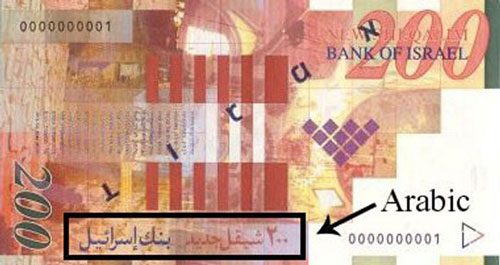

Entrance
of the State Comptroller and Ombudsman's 's official Arabic website (Feb
3, 2004) (Feb
3, 2004)

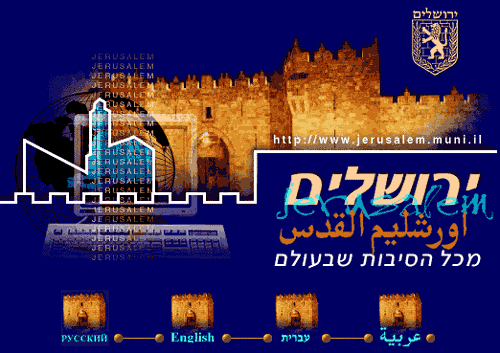
Entrance
of the Jerusalem Municipality's official Arabic website  (Jan 7, 2005)
(Jan 7, 2005)
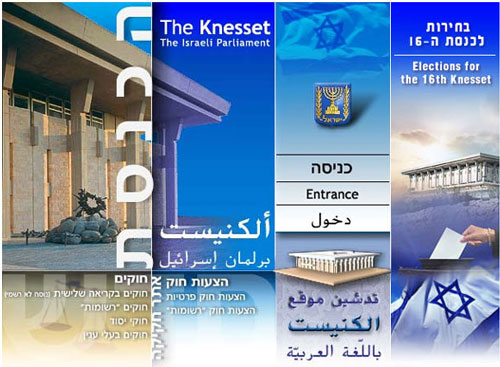
Entrance
of the the Israeli Parliament's official Arabic website
(Feb 3, 2004) website
(Feb 3, 2004)
 Friday
Sermon on Palestinian Authority official TV (Jun 8, 2001) (MPG,
4.2 MB): Friday
Sermon on Palestinian Authority official TV (Jun 8, 2001) (MPG,
4.2 MB):
"... I pray to Allah that we live to see the usurping Knesset
[Israeli Parliament] collapse on the heads of the Jews ..."
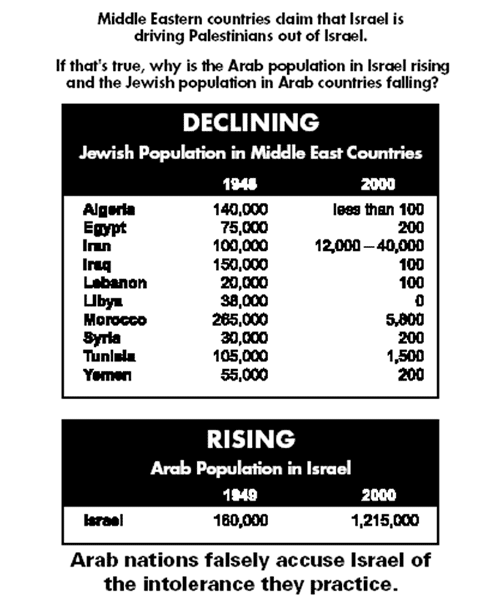
 The
Arab Population in Israel (Israel
Central Buero of Statistics) (PDF,
201 KB): The
Arab Population in Israel (Israel
Central Buero of Statistics) (PDF,
201 KB):
"8 times its size in 1948." - one
of the world's highest annual growth rates (3.92 p.a.).
 Israel's
Population (Israel Central Bureau of Statistics) (PDF,
256 KB) Israel's
Population (Israel Central Bureau of Statistics) (PDF,
256 KB)
 Kill
a Jew for Allah. The Mideast problem. (John Derbyshire, NRO, Mar
22, 2002): "Look: Possibly there would be some abstract
justice in closing down the settlements, I don't know. I don't see
it myself, I must admit. Why should
Jews not live among Arabs? Lots of Arabs live in Israel,
and do very well there. There are rich Israeli Arabs; there are
Israeli-Arab pop stars and comedians; there are Israeli-Arab intellectuals,
teachers, writers, businessmen, athletes. Why, when the whole thing
gets sorted out, should there not be Jews living in Arab territory
— as there were for centuries past? What, exactly, is wrong
with the settlements? I don't see it." Kill
a Jew for Allah. The Mideast problem. (John Derbyshire, NRO, Mar
22, 2002): "Look: Possibly there would be some abstract
justice in closing down the settlements, I don't know. I don't see
it myself, I must admit. Why should
Jews not live among Arabs? Lots of Arabs live in Israel,
and do very well there. There are rich Israeli Arabs; there are
Israeli-Arab pop stars and comedians; there are Israeli-Arab intellectuals,
teachers, writers, businessmen, athletes. Why, when the whole thing
gets sorted out, should there not be Jews living in Arab territory
— as there were for centuries past? What, exactly, is wrong
with the settlements? I don't see it."
 Myth:
United Nations Security Council Resolution 242 calls for immediate
Israeli withdrawal to pre-1967 borders:
Fact: Resolution 242 makes two points in relation to drawing borders
in the Middle East. First, it calls for a "withdrawal of Israeli
armed forces from territories occupied in the recent conflict."
Notably, there is no article or modifier applied to the word "territories."
This is in fact not a semantic detail; the omission was deliberate
and meant to highlight the fact that there was no expectation that
Israel would be forced to resume the pre-1967 borders. Efforts by
Soviet First Deputy Foreign Minister Vasily Kuznetsov failed to
convince the council members that adding the word "all"
would be productive; the Security Council rejected the Soviet draft
and unanimously adopted the British-drafted text as Resolution 242.
Moreover, Resolution 242 calls for "Termination of all claims
or states of belligerence and respect for and acknowledgement of
the sovereignty, territorial integrity and political independence
of every State in the area, and their right to live in peace within
secure and recognized boundaries free from threats or acts of force."
Such recognition by the Arab powers of Israel's right to peaceful
existence has never occurred. Eugene Rostow, Sterling Professor
Emeritus of Law and Public Affairs at Yale University and Chairman
of the Interdepartmental Control Group responsible for shaping U.S.
policy in the Middle East at the time, wrote, "until the states
concerned in the dispute make peace in accordance with Resolution
242, the Security Council decided, Israel could remain in the territories
it held after the Six Day War as occupying power. The legality and
legitimacy of its presence as occupying power is thus certified
by the Security Council." Myth:
United Nations Security Council Resolution 242 calls for immediate
Israeli withdrawal to pre-1967 borders:
Fact: Resolution 242 makes two points in relation to drawing borders
in the Middle East. First, it calls for a "withdrawal of Israeli
armed forces from territories occupied in the recent conflict."
Notably, there is no article or modifier applied to the word "territories."
This is in fact not a semantic detail; the omission was deliberate
and meant to highlight the fact that there was no expectation that
Israel would be forced to resume the pre-1967 borders. Efforts by
Soviet First Deputy Foreign Minister Vasily Kuznetsov failed to
convince the council members that adding the word "all"
would be productive; the Security Council rejected the Soviet draft
and unanimously adopted the British-drafted text as Resolution 242.
Moreover, Resolution 242 calls for "Termination of all claims
or states of belligerence and respect for and acknowledgement of
the sovereignty, territorial integrity and political independence
of every State in the area, and their right to live in peace within
secure and recognized boundaries free from threats or acts of force."
Such recognition by the Arab powers of Israel's right to peaceful
existence has never occurred. Eugene Rostow, Sterling Professor
Emeritus of Law and Public Affairs at Yale University and Chairman
of the Interdepartmental Control Group responsible for shaping U.S.
policy in the Middle East at the time, wrote, "until the states
concerned in the dispute make peace in accordance with Resolution
242, the Security Council decided, Israel could remain in the territories
it held after the Six Day War as occupying power. The legality and
legitimacy of its presence as occupying power is thus certified
by the Security Council."
 From
"occupied territories" to "disputed territories"
(Dore Gold): "The politically-loaded term "occupied
territories" or "occupation" seems to apply only
to Israel and is hardly ever used when other territorial disputes
are discussed, especially by interested third parties. For example,
the U.S. Department of State refers to Kashmir as "disputed
areas. Similarly in its Country Reports on Human Rights Practices,
the State Department describes the patch of Azerbaijan claimed as
an independent republic by indigenous Armenian separatists as "the
disputed area of Nagorno-Karabakh." From
"occupied territories" to "disputed territories"
(Dore Gold): "The politically-loaded term "occupied
territories" or "occupation" seems to apply only
to Israel and is hardly ever used when other territorial disputes
are discussed, especially by interested third parties. For example,
the U.S. Department of State refers to Kashmir as "disputed
areas. Similarly in its Country Reports on Human Rights Practices,
the State Department describes the patch of Azerbaijan claimed as
an independent republic by indigenous Armenian separatists as "the
disputed area of Nagorno-Karabakh."
 Israeli
Settlements and International Law (MFA) Israeli
Settlements and International Law (MFA)
 INTERNATIONAL
LAW AND THE ARAB-ISRAEL CONFLICT INTERNATIONAL
LAW AND THE ARAB-ISRAEL CONFLICT
(Extracts from "Israel and Palestine - Assault on the Law of
Nations", Prof. Julius Stone): (PDF
1.4 MB)
"The legality of Israel's presence in Jerusalem, Judea, Samaria
and Gaza has been the subject of heated argument since 1967. Some
regard these areas as illegally occupied, others as disputed territories
and there is an obvious need for clarity if the subject is to be
discussed rationally in terms of facts rather than assumptions."
 Does
Israel Need a Plan? (Daniel Pipes, Commentary, Feb 2003): "Much
as the Israelis have to gain from a victory over the Palestinians,
the Palestinians have more to gain from defeat. From the point of
view of American policy, helping them to achieve a change of heart
is thus an unobjectionable goal, beneficial to both parties. And
while ultimately it is up to the Palestinians to liberate themselves
from the demons of their own irredentism, others, especially Israelis
and Americans, can indeed help—by holding firm against the
seductive appeal of road maps that lead exactly in the wrong direction." Does
Israel Need a Plan? (Daniel Pipes, Commentary, Feb 2003): "Much
as the Israelis have to gain from a victory over the Palestinians,
the Palestinians have more to gain from defeat. From the point of
view of American policy, helping them to achieve a change of heart
is thus an unobjectionable goal, beneficial to both parties. And
while ultimately it is up to the Palestinians to liberate themselves
from the demons of their own irredentism, others, especially Israelis
and Americans, can indeed help—by holding firm against the
seductive appeal of road maps that lead exactly in the wrong direction."
 Israel
Comparison Maps (IRIS): Compare the map of Israel with maps
of other areas drawn to the same scale, to put Israel's size into
perspective. In these maps, Israel is portrayed including all land
currently under its authority. Still, Israel is small compared with
most countries around the world, most states in the U.S. and most
other countries in its region. Israel
Comparison Maps (IRIS): Compare the map of Israel with maps
of other areas drawn to the same scale, to put Israel's size into
perspective. In these maps, Israel is portrayed including all land
currently under its authority. Still, Israel is small compared with
most countries around the world, most states in the U.S. and most
other countries in its region.
Israel
is democratic and tiny - 1/6 (one sixth!!!) of a percent of the
total land area of the Arab states and Iran. Israel
is 9 miles at its narrowest. Yet Arab propagandists call Israel
"expansionist". Most Israelis live in Metropolitan
Jerusalem, Tel Aviv and Haifa, a short distance from the pre-1967
armistice lines, vulnerable to surprise attack from the surrounding
autocratic regimes and within the shooting range of light ballistic
weapons available to terrorists:
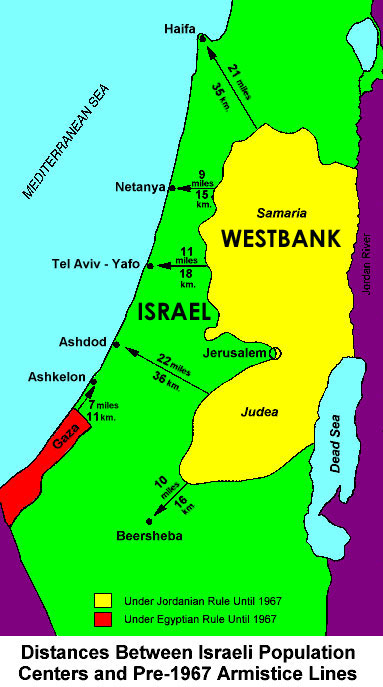
  Geneva
Convention (IV) relative to the Protection of Civilian Persons in
Time of War, Part I, Art. 3:
"(1) Persons taking no active
part in the hostilities, including members of armed forces
who have laid down their arms and those placed hors de combat by
sickness, wounds, detention, or
any other cause, shall in all circumstances
be treated humanely, without any adverse distinction founded on
race, colour, religion or faith, sex, birth or wealth, or any other
similar criteria. To this end the
following acts are and shall remain prohibited at any time and in
any place whatsoever with respect to the above-mentioned persons:
(a) violence to life and person, in particular murder of all kinds,
mutilation, cruel treatment and torture;" Geneva
Convention (IV) relative to the Protection of Civilian Persons in
Time of War, Part I, Art. 3:
"(1) Persons taking no active
part in the hostilities, including members of armed forces
who have laid down their arms and those placed hors de combat by
sickness, wounds, detention, or
any other cause, shall in all circumstances
be treated humanely, without any adverse distinction founded on
race, colour, religion or faith, sex, birth or wealth, or any other
similar criteria. To this end the
following acts are and shall remain prohibited at any time and in
any place whatsoever with respect to the above-mentioned persons:
(a) violence to life and person, in particular murder of all kinds,
mutilation, cruel treatment and torture;"
 Israel
and Gaza (Professor Louis Rene Beres, Washington Times, May 27,
2004): "the Hague Regulations
disallow placement of military assets or personnel in heavily populated
civilian areas. Further prohibition of perfidy
is found in Protocol I of the 1977 addition to the Geneva Conventions
of 1949, and it is widely recognized that these rules also are binding
on the basis of customary international law. Perfidy represents
an especially serious violation of the Law of War, one identified
as a "grave breach" in Article 147 of Geneva Convention
IV. The full legal effect of perfidy
committed by Palestinian terrorist leaders is to immunize Israel
from any responsibility for counterterrorist harms done to Arab
civilians. All combatants, including Palestinian terrorists, are
bound by the Law of War of international law.
This requirement is found in Article 3, common to the four Geneva
Conventions of Aug. 12, 1949, and at the two protocols to these
Conventions. Protocol I applies humanitarian international law to
all conflicts fought for "self-determination," the stated
objective of all Palestinian fighters. This
protocol brings all irregular forces within the full scope of international
law. Israel has both the right and the obligation under international
law to protect its citizens from criminal acts of terrorism.
Should it ever decide to yield to Palestinian perfidy in its indispensable
war against escalating Arab violence, Israel would surrender this
important right and undermine this fundamental obligation." Israel
and Gaza (Professor Louis Rene Beres, Washington Times, May 27,
2004): "the Hague Regulations
disallow placement of military assets or personnel in heavily populated
civilian areas. Further prohibition of perfidy
is found in Protocol I of the 1977 addition to the Geneva Conventions
of 1949, and it is widely recognized that these rules also are binding
on the basis of customary international law. Perfidy represents
an especially serious violation of the Law of War, one identified
as a "grave breach" in Article 147 of Geneva Convention
IV. The full legal effect of perfidy
committed by Palestinian terrorist leaders is to immunize Israel
from any responsibility for counterterrorist harms done to Arab
civilians. All combatants, including Palestinian terrorists, are
bound by the Law of War of international law.
This requirement is found in Article 3, common to the four Geneva
Conventions of Aug. 12, 1949, and at the two protocols to these
Conventions. Protocol I applies humanitarian international law to
all conflicts fought for "self-determination," the stated
objective of all Palestinian fighters. This
protocol brings all irregular forces within the full scope of international
law. Israel has both the right and the obligation under international
law to protect its citizens from criminal acts of terrorism.
Should it ever decide to yield to Palestinian perfidy in its indispensable
war against escalating Arab violence, Israel would surrender this
important right and undermine this fundamental obligation."
 Without
distinction - attacks on civilians by Palestinian armed groups (Amnesty
International): "The deliberate
killing of Israeli civilians by Palestinian armed groups amounts
to crimes against humanity. As defined in the
Rome Statute of the International Criminal Court, crimes against
humanity are various acts committed as part of a ''widespread or
systematic attack directed against any civilian population'', ''pursuant
to or in furtherance of a State or organization's policy to commit
such attack''. (71) The specified acts include murder, torture and
''other inhumane acts of a similar character intentionally causing
great suffering, or serious injury to body or to mental or physical
health.'' (72) Crimes against humanity do not require a link to
an armed conflict - they can be committed either in peacetime or
in wartime. The deliberate killings
of Israeli civilians by Palestinian armed groups and individuals
are both widespread and systematic, and are perpetrated as part
of a publicly announced policy to target civilians. They
therefore satisfy the definition of crimes against humanity included
in the Rome Statute of the International Criminal Court, which is
recognized as reflecting customary international law. War crimes
and crimes against humanity are among the most serious crimes under
international law, and represent offences against humanity as a
whole. Bringing the perpetrators of these crimes to justice is therefore
the concern and the responsibility of the international community.
This view is illustrated in the Preamble to the Rome Statute of
the International Criminal Court, adopted in July 1998, which affirms
that the most serious crimes of concern to the international community
as a whole must not go unpunished and that their effective prosecution
must be ensured by taking measures at the national level and by
enhancing international cooperation. Without
distinction - attacks on civilians by Palestinian armed groups (Amnesty
International): "The deliberate
killing of Israeli civilians by Palestinian armed groups amounts
to crimes against humanity. As defined in the
Rome Statute of the International Criminal Court, crimes against
humanity are various acts committed as part of a ''widespread or
systematic attack directed against any civilian population'', ''pursuant
to or in furtherance of a State or organization's policy to commit
such attack''. (71) The specified acts include murder, torture and
''other inhumane acts of a similar character intentionally causing
great suffering, or serious injury to body or to mental or physical
health.'' (72) Crimes against humanity do not require a link to
an armed conflict - they can be committed either in peacetime or
in wartime. The deliberate killings
of Israeli civilians by Palestinian armed groups and individuals
are both widespread and systematic, and are perpetrated as part
of a publicly announced policy to target civilians. They
therefore satisfy the definition of crimes against humanity included
in the Rome Statute of the International Criminal Court, which is
recognized as reflecting customary international law. War crimes
and crimes against humanity are among the most serious crimes under
international law, and represent offences against humanity as a
whole. Bringing the perpetrators of these crimes to justice is therefore
the concern and the responsibility of the international community.
This view is illustrated in the Preamble to the Rome Statute of
the International Criminal Court, adopted in July 1998, which affirms
that the most serious crimes of concern to the international community
as a whole must not go unpunished and that their effective prosecution
must be ensured by taking measures at the national level and by
enhancing international cooperation.
 Victims
of Terror (CNN Special) Victims
of Terror (CNN Special)
 Victims
of Palestinian Violence and Terrorism since September 2000 (MFA) Victims
of Palestinian Violence and Terrorism since September 2000 (MFA)

If
you're a headstrong Arab or Iranian, bent on protest, Israel is
in every respect a paradise compared with any other state in the
Middle East:
In Lebanon, don’t try speaking out against
the Syrian occupation. You won’t live long.
In Saudi Arabia, don’t try converting from Islam. You won't
live long.
In Somalia, don’t try refusing sexual mutilation of your sister.
She and you won't live long.
In Tunisia, don’t try saying the government is corrupt. You
won't live long.
In Egypt, don’t try being a homosexual. You won't live long.
In Sudan, don’t try being a separatist. You won’t live
long.
In Iran, don’t try having an affair. You won’t live
long.
In Iraq, don’t try to be a party activist. You won’t
live long.
In Algeria, don’t try to be suspected of Islamism. You won't
live long.
In Libya, don’t try asking about her role in international
terrorism. You won’t live long.
In Mauritania, don’t try helping a slave run away. He and
you won’t live long.
In Syria, don’t try throwing stones at police. You won't live
long.
In Oman, don’t try demonstrating for women rights. You won’t
live long.
In Morocco, don’t try saying Arab Saharawis have been displaced.
You won’t live long.
In Yemen, don’t try apostasy. You won’t live long.
In the Palestinian Authority, don’t try supporting democratic
Israel. You won’t live long.
 Ten
Tips on How to Be an Arafat Apologist (Jamie Glazov, Frontpage Magazin,
Apr 11, 2002) Ten
Tips on How to Be an Arafat Apologist (Jamie Glazov, Frontpage Magazin,
Apr 11, 2002)
 Stuck
on a Barrier That's Not on the Road Map (Charles Krauthammer, Washington
Post, Aug 8, 2003): "There have been nearly 100 Palestinian
suicide bombings. All the terrorists
came from the West Bank, where the barrier is being built. Not a
single one has come from Gaza. Why? Because there already is a fence
separating Gaza from Israel. ... In
America, we build stretches of fence along the Mexican border to
prevent foreigners from coming in to take jobs. It takes a lot of
audacity to demand that Israel stop building a fence whose purpose
is to prevent foreigners from coming in to commit mass murder.
As part of the propaganda campaign against the barrier, it
has been called a wall. In fact, it is a fence, with electronics
on either side to prevent infiltrators. It is wall-like for only
about a tenth of its length -- in just two places, both along the
Trans-Israel Highway. Why? Because Palestinian gunmen had been shooting
from Palestinian territory onto the highway and killing innocent
Israelis." Stuck
on a Barrier That's Not on the Road Map (Charles Krauthammer, Washington
Post, Aug 8, 2003): "There have been nearly 100 Palestinian
suicide bombings. All the terrorists
came from the West Bank, where the barrier is being built. Not a
single one has come from Gaza. Why? Because there already is a fence
separating Gaza from Israel. ... In
America, we build stretches of fence along the Mexican border to
prevent foreigners from coming in to take jobs. It takes a lot of
audacity to demand that Israel stop building a fence whose purpose
is to prevent foreigners from coming in to commit mass murder.
As part of the propaganda campaign against the barrier, it
has been called a wall. In fact, it is a fence, with electronics
on either side to prevent infiltrators. It is wall-like for only
about a tenth of its length -- in just two places, both along the
Trans-Israel Highway. Why? Because Palestinian gunmen had been shooting
from Palestinian territory onto the highway and killing innocent
Israelis."
 Palestinian
Pretense & Israeli Reality. What the world knows, but can’t
say, to be true (Victor Davis Hanson, NRO, Mar 18, 2003): "Much
of the problem, then, quite simply is also psychological and arises
because a Jewish state is right smack in the middle of the Arab
world — and by every measure of economic, political, social,
and cultural success thriving amid misery. Without
oil, without a large population, without friendly countries on its
borders, without vast real estate, and without the Suez Canal, it
somehow provides its citizenry with a way of life far more humane
than what is found in Syria, Iraq, Lebanon, Jordan, or Egypt. Yet
the world listens to the Palestinians' often-duplicitous leadership
— despite the corrupt nature and murderous past history of
Mr. Arafat's regime — because its sponsors sell a good part
of the globe's oil. And to risk their wrath, one would have to support
a few million Jews, not hundreds of millions of, say, British, Swedes,
or Italians. And so we give not a damn over millions of innocents
elsewhere butchered over millions of acres each year worldwide,
but instead focus on what the Palestinians lost while attempting
to destroy their neighbors." Palestinian
Pretense & Israeli Reality. What the world knows, but can’t
say, to be true (Victor Davis Hanson, NRO, Mar 18, 2003): "Much
of the problem, then, quite simply is also psychological and arises
because a Jewish state is right smack in the middle of the Arab
world — and by every measure of economic, political, social,
and cultural success thriving amid misery. Without
oil, without a large population, without friendly countries on its
borders, without vast real estate, and without the Suez Canal, it
somehow provides its citizenry with a way of life far more humane
than what is found in Syria, Iraq, Lebanon, Jordan, or Egypt. Yet
the world listens to the Palestinians' often-duplicitous leadership
— despite the corrupt nature and murderous past history of
Mr. Arafat's regime — because its sponsors sell a good part
of the globe's oil. And to risk their wrath, one would have to support
a few million Jews, not hundreds of millions of, say, British, Swedes,
or Italians. And so we give not a damn over millions of innocents
elsewhere butchered over millions of acres each year worldwide,
but instead focus on what the Palestinians lost while attempting
to destroy their neighbors."
 Israel
related documents at Middle East Media Research Institute (MEMRI) Israel
related documents at Middle East Media Research Institute (MEMRI)
 Library
of Congress's Country Studies (Israel - General) Library
of Congress's Country Studies (Israel - General)
 CIA
World Factbook (Israel) CIA
World Factbook (Israel)
 CIA
World Factbook (Westbank) CIA
World Factbook (Westbank)
 CIA
World Factbook (Gaza Strip) CIA
World Factbook (Gaza Strip)
|




